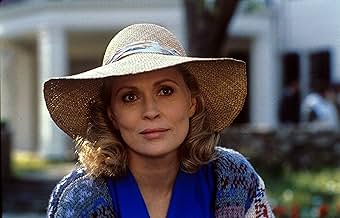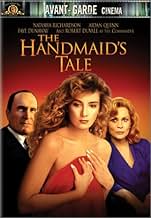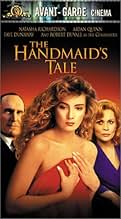Num mundo de tiranía religiosa, uma jovem mulher é escravisada sexualmente por sua fertilidade.Num mundo de tiranía religiosa, uma jovem mulher é escravisada sexualmente por sua fertilidade.Num mundo de tiranía religiosa, uma jovem mulher é escravisada sexualmente por sua fertilidade.
- Direção
- Roteiristas
- Artistas
- Prêmios
- 2 vitórias e 1 indicação no total
Reiner Schöne
- Luke
- (as Rainer Schoene)
Robert D. Raiford
- Dick
- (as Robert Raiford)
- Direção
- Roteiristas
- Elenco e equipe completos
- Produção, bilheteria e muito mais no IMDbPro
Avaliações em destaque
Margaret Atwood, a Canadian novelist (and poet) wrote the dark fantasy novel on which this film is based. It is set in The Republic of Gilead, formerly the United States, or at least the parts of it that are not radioactive. The radioactive parts are called the colonies, where bad girls are sent to die of radiation poisoning. The time is the near future, after the inevitable nuclear war, and the breakdown of government as we know it.
The society depicted in The Handmaid's Tale is a nightmare: everyone is watched by the Eyes, unknowable, unseen government spies. Women are forbidden to have jobs. They are irrevocably assigned to classes. At the top are the chaste, but morally superior, Wives, almost all of whom have been rendered infertile by the inevitable unclear war. At the bottom are the housekeepers, or Marthas, who are non-entities. In the middle are the Handmaids of the title, who are fertile, but tightly controlled. The term Handmaid is a Biblical term that is used in the Old Testament stories of Abraham, Sarah, Jacob and Rachel. In the Bible, the wives gave their handmaids to their husbands in order to produce heirs.
Handmaids, in the film and the book, are forced to have sex with the Commanders, the husbands of the Wives. During this sex, the Wives are intimately present to take in any "love" their Commanders have to give.
The Handmaids are trained to remain unattached to the Commanders. They are prohibited from using makeup or doing anything to make themselves attractive. Handmaids are forced to turn their offspring over to the morally "fit" Wives.
Robert Duvall, a Commander in whose home Offred is placed, gives a family Bible reading performance that will curdle the blood of true people of faith. It is a breathtaking, heart-stopping performance.
The government is totalitarian and monotheistic. The one god is very strict, and has His Eyes everywhere.
Offred, who was once known as Kate, is a Handmaid who, despite her training (read brainwashing), recalls her past, her loving husband, and her adored daughter. She tells with sparkling, and terrifying clarity, how the society came to be the way it is.
This governmental aspect of the story is instructive, however, they are almost totally absent in the film.
Offred's/Kate's personal story is heartrending. It reminds one of the miseries of, say, the women of Darfur. When the government breaks down, she and her husband and daughter attempt to flee to Canada. Unfortunately, they are caught. Her daughter is "confiscated." Her husband is taken away. She never sees her husband again.
Offred's training is not as extensively portrayed in the film as it is in the book, but her feeling of terror and helplessness are palpable, in an exquisite performance by Natasha Richardson. Warning, blood is shown.
As we ride down the slippery slope toward the overturning of Roe v. Wade, this film is a must see for those who still care about women's rights.
The society depicted in The Handmaid's Tale is a nightmare: everyone is watched by the Eyes, unknowable, unseen government spies. Women are forbidden to have jobs. They are irrevocably assigned to classes. At the top are the chaste, but morally superior, Wives, almost all of whom have been rendered infertile by the inevitable unclear war. At the bottom are the housekeepers, or Marthas, who are non-entities. In the middle are the Handmaids of the title, who are fertile, but tightly controlled. The term Handmaid is a Biblical term that is used in the Old Testament stories of Abraham, Sarah, Jacob and Rachel. In the Bible, the wives gave their handmaids to their husbands in order to produce heirs.
Handmaids, in the film and the book, are forced to have sex with the Commanders, the husbands of the Wives. During this sex, the Wives are intimately present to take in any "love" their Commanders have to give.
The Handmaids are trained to remain unattached to the Commanders. They are prohibited from using makeup or doing anything to make themselves attractive. Handmaids are forced to turn their offspring over to the morally "fit" Wives.
Robert Duvall, a Commander in whose home Offred is placed, gives a family Bible reading performance that will curdle the blood of true people of faith. It is a breathtaking, heart-stopping performance.
The government is totalitarian and monotheistic. The one god is very strict, and has His Eyes everywhere.
Offred, who was once known as Kate, is a Handmaid who, despite her training (read brainwashing), recalls her past, her loving husband, and her adored daughter. She tells with sparkling, and terrifying clarity, how the society came to be the way it is.
This governmental aspect of the story is instructive, however, they are almost totally absent in the film.
Offred's/Kate's personal story is heartrending. It reminds one of the miseries of, say, the women of Darfur. When the government breaks down, she and her husband and daughter attempt to flee to Canada. Unfortunately, they are caught. Her daughter is "confiscated." Her husband is taken away. She never sees her husband again.
Offred's training is not as extensively portrayed in the film as it is in the book, but her feeling of terror and helplessness are palpable, in an exquisite performance by Natasha Richardson. Warning, blood is shown.
As we ride down the slippery slope toward the overturning of Roe v. Wade, this film is a must see for those who still care about women's rights.
I finally watched this after watching the TV show and if anything, it shows that some books should not be adapted unless there is enough time to tell the story.
The film tries to feature the key moments that the TV show had time to bring up, and 90 minutes (or so) simply isn't enough.
The casting is flawed on several characters, like many reviewers point at, and the script feels rushed, which of course creates the feeling that the story progresses without any logic.
Nonetheless you will find some scenes are really good, and in fact, those same scenes found their way into the TV show.
The atmosphere of the book is well conveyed, I just wish they had had more time, which the largely superior TV show had.
Watch this for reference after reading the book, after watching the show : great books can make awesome TV shows but poor films sometimes.
The film tries to feature the key moments that the TV show had time to bring up, and 90 minutes (or so) simply isn't enough.
The casting is flawed on several characters, like many reviewers point at, and the script feels rushed, which of course creates the feeling that the story progresses without any logic.
Nonetheless you will find some scenes are really good, and in fact, those same scenes found their way into the TV show.
The atmosphere of the book is well conveyed, I just wish they had had more time, which the largely superior TV show had.
Watch this for reference after reading the book, after watching the show : great books can make awesome TV shows but poor films sometimes.
An unfortunate movie which is definitely more like Harold Pinter's earlier plays than anything Margaret Atwood ever produced. No attempt is made to bring out Atwood's clever social message, and we're all supposed to be shocked at the sexual content. A shame, because Atwood's version might have made a good film.
The handmaids in brilliant red, the wives in electric blue, the children in white--Margaret Atwood's neo-fascist state comes startingly alive in Schloendorff's film. The bright colors are oppressive in their uniformity, whether in the "ceremony"--Robert Duvall's passionless copulation with Natasha Richardson as she lies in the lap of his sterile wife, Faye Dunaway--or in the party to celebrate the birth of a handmaid's child, or the execution of another handmaid for fornication. There are several fine actors--Elizabeth McGovern and Aidan Quinn also play memorable, if brief, roles--but the cinematography steals the show here, giving this anti-Utopia the same oppressive tension as the original 1984 and far surpassing any version of Brave New World. It may be that Atwood's book, which I haven't read, adds layers of depth to the characters and plot, but Schloendorff's visualisation is a real enhancement to the tale. He creates the tension of a police state with only momentary intrusions of brutality or machinery. A strong film that will gain its following with time.
This movie, based on Margaret Atwood's story, concerns a woman living in the not too distant future in the Republic of Gilead, a country that was once the United States. The country is now run by fundamentalist Christians who have demoted all women to a second class citizenship. Nuclear war has made most women infertile, so the government has forced all the fertile women to serve as handmaids and bear children for the leaders and their infertile wives as part of a biblical prophecy. The infertile women are sent off to toil as slaves and clean up nuclear waste. This movie concerns one handmaid, Offred (Kate) and her struggle to escape Gilead, find her daughter, and flee to Canada. Not a bad movie at all, all the actors do very well. The material just runs very slow at points, and the character's aren't all that well developed.
Você sabia?
- CuriosidadesWhile working on the film, Robert Duvall became so fascinated with evangelism that it inspired him to write O Apóstolo (1997).
- Erros de gravaçãoWhen Moira ties up Aunt Lydia and escapes the Red Center, it is late at night, but moments later, when she exits, it is clearly daytime.
- Trilhas sonorasWhispering Hope
Written by Septimus Winner as Alice Hawthorne
Principais escolhas
Faça login para avaliar e ver a lista de recomendações personalizadas
- How long is The Handmaid's Tale?Fornecido pela Alexa
Detalhes
- Data de lançamento
- Países de origem
- Central de atendimento oficial
- Idioma
- Também conhecido como
- A História da Aia
- Locações de filme
- James Adams Buchanan House, 1810 Cedar St, Durham, Carolina do Norte, EUA(Commander Fred's house)
- Empresas de produção
- Consulte mais créditos da empresa na IMDbPro
Bilheteria
- Faturamento bruto nos EUA e Canadá
- US$ 4.960.385
- Fim de semana de estreia nos EUA e Canadá
- US$ 738.578
- 11 de mar. de 1990
- Faturamento bruto mundial
- US$ 4.960.385
- Tempo de duração1 hora 49 minutos
- Cor
- Mixagem de som
- Proporção
- 1.85 : 1
Contribua para esta página
Sugerir uma alteração ou adicionar conteúdo ausente

Principal brecha
What is the Hindi language plot outline for A Decadência de uma Espécie (1990)?
Responda


































